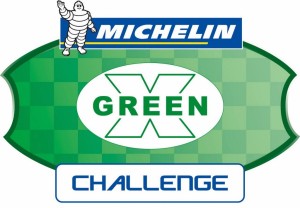So, yeah I know there are races for solar-powered cars and such, so its not a novel idea, but this morning while flipping through channels I caught mention of a pro racing circuit that awards green initiatives. No, it's not NASCAR, silly. In the American Le mans Series, the MICHELIN® GREEN X® Challenge, a first class, world-class environmental competition, challenges all prototypes and GT entries in the field to race 'green'.
Per the Green X web site:
 America’s premier environmental motorsports competition, the MICHELIN® GREEN X® Challenge enters its third season of American Le Mans Series competition in 2011. The MICHELIN® GREEN X® Challenge recognizes the Prototype and GT category cars that prove “cleanest, fastest, most efficient” in the race within each ALMS event.
America’s premier environmental motorsports competition, the MICHELIN® GREEN X® Challenge enters its third season of American Le Mans Series competition in 2011. The MICHELIN® GREEN X® Challenge recognizes the Prototype and GT category cars that prove “cleanest, fastest, most efficient” in the race within each ALMS event.
Lots more info in the American Le Mans Series (ALMS) green racing program can be seen here.
Basically, at the end of each ALMS race Michelin recognizes the winning teams and also presents championship trophies to the class leaders with the best cumulative score at the end of the season.
The Green Challenge and the MGXC scoring formula is expressed as: Clean + Fast + Efficient = Green Racing score
What is the Green X Challenge?
Per the Green X web site:
 America’s premier environmental motorsports competition, the MICHELIN® GREEN X® Challenge enters its third season of American Le Mans Series competition in 2011. The MICHELIN® GREEN X® Challenge recognizes the Prototype and GT category cars that prove “cleanest, fastest, most efficient” in the race within each ALMS event.
America’s premier environmental motorsports competition, the MICHELIN® GREEN X® Challenge enters its third season of American Le Mans Series competition in 2011. The MICHELIN® GREEN X® Challenge recognizes the Prototype and GT category cars that prove “cleanest, fastest, most efficient” in the race within each ALMS event.
Overseen by the Green Racing steering group composed of members of the U.S. Department of Energy, the Environmental Protection Agency, SAE International and IMSA, the scores are determined by measuring well-to wheel oil consumption and emissions, race speed, energy use, and vehicle weight against category competitors.
The MICHELIN® GREEN X® Challenge awards are now a fixture at virtually every major sports car endurance event worldwide, including the 24 Hours of Le Mans, the American, Asian and European Le Mans series, and the new Intercontinental Le Mans Cup series events.
Lots more info in the American Le Mans Series (ALMS) green racing program can be seen here.
Basically, at the end of each ALMS race Michelin recognizes the winning teams and also presents championship trophies to the class leaders with the best cumulative score at the end of the season.
How do you race Green?
The Green Challenge and the MGXC scoring formula is expressed as: Clean + Fast + Efficient = Green Racing score
- Clean = The amount of greenhouse gases emitted and petroleum consumed, based on the total life cycle (commonly called “well-to-wheels”) for the type of fuel used.
- Speed = The car’s average race speed while on the track divided into 1000. This way a higher speed yields a smaller score to match the lower-is-better scoring philosophy.
- Efficient = The amount of energy required to complete the race at the speed and distance of the class winner divided by the car’s mass. This method allows direct and evenhanded comparisons between the efficiency of all cars. Note: this factor differs from a fuel economy (miles-per-gallon) approach because it takes the weight of the vehicle into account. It measures how well the energy consumed was used.

Comments
Post a Comment